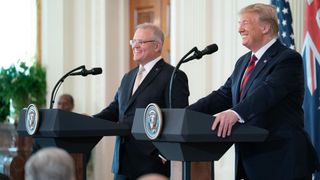Scott Morrison joined US President Donald Trump at the weekend in subtly changing the economic conversation with respect to China. Not so long ago it was largely a one-sided debate about what we — especially the US — needed to do to adjust to China’s rise.
Not so in Washington. The Prime Minister backed Trump’s insistence on a comprehensive deal with China that would address serious issues such as intellectual property theft and illegitimate subsidies to state-owned-enterprises. Morrison encouraged China to take every opportunity to resolve its economic disputes with the US, suggesting that Chinese intransigence is a big part of the problem. This change in emphasis from America as the provocateur to China as the true disrupter is helpful. It is also justified and overdue.
The genius in Beijing’s manipulation of grand narrative is that it conditions other countries to accept Chinese policies no matter how unsettling they might be. One of the most effective conceptions promulgated by China is that it is fundamentally undeterrable once it has made up its mind.
The genius in Beijing’s manipulation of grand narrative is that it conditions other countries to accept Chinese policies no matter how unsettling they might be. One of the most effective conceptions promulgated by China is that it is fundamentally undeterrable once it has made up its mind.
This is augmented by the assertion that its authoritarian set-up gives it an enormous advantage over chaotic and indecisive democracies. Once the Communist Party sets course, there is no turning back and Beijing is prepared to pay any cost to achieve its goals.
The benefit of this argument for China is that once we accept that as a given — which many of our policy elites tend to — then the only reasonable action is for others to compromise and alter their objectives if they seek to avoid instability or even war. As the most powerful nation, the onus shifts to the US to change its policies or accept the blame for all that is troubling the world.
This narrative played out particularly well for Beijing in the South China Sea. It is strange that outside of Tokyo and Canberra, the US is often publicly cast as the provocateur when it is conducting freedom-of-navigation operations, even though these exist to reaffirm principles and rights under international law. That perverse attribution of fault is based on this flawed and self-defeating logic: if China cannot be deterred, what’s the point of any escalation to oppose Beijing’s illegal actions?
That same narrative was evident when Trump first began his economic offensive against China.
Many inside and outside China crowed about how America’s soft and divided democratic society would never allow a president to erect tariffs for too long. In contrast, China’s authoritarian political economy was far more resilient and resourceful. That this would end in an embarrassing backdown by the White House was the common wisdom among most experts.
Furthermore, the assumption that Beijing would never change course meant Trump and not Chinese President Xi Jinping was condemned as the primary threat to the global economy. Because Beijing has always engaged in these illegitimate practices and will continue to do so, Trump was cast as the culprit for seeking to reframe the US’s economic relationship with China. This is despite there being widespread acknowledgment that Chinese protectionist and mercantilist policies are of such depth and scale as to pose a systemic threat to the global economic system.
Morrison is ahead of the curve in rejecting that earlier perverse reasoning. At the weekend, he didn’t simply insist that the US immediately reject protectionism but agreed that any US-China agreement had to properly resolve longstanding structural issues pertaining to Chinese economic policies and practices for any agreement to endure.
This is some distance from earlier positions held by most governments around the world that economic confrontation is always inadvisable.
Redirecting focus and putting the ball in China’s court is helped by emerging evidence that Beijing holds a weaker hand than it has been letting on. Its economy is growing significantly less than official figures suggest and even the official figure is the lowest since 1992. Its firms are severely over-leveraged and corporate debt is the highest in the world in absolute and relative terms.
Having centralised power for himself, Xi is under enormous pressure as voices inside the party openly accuse him of economic overreach and mismanaging the relationship with the US. Xi is on the defensive over criticisms of the Belt and Road Initiative and Made in China 2025, the blueprint to dominate hi-tech sectors of the future. China has yet to offer any meaningful concessions. But Xi is at least sensing growing resolve against his economic policies and recalculating the benefits and costs of his actions.
Even if Beijing’s favoured narrative that it can absorb any punishment is diminished, it will want to ensure resolve against it remains fragmented. It knows the great error in Trump’s approach is that the President has given little incentive for other economies such as Japan and those in the EU and ASEAN to join this conversation.
This is the essential missing piece. Where does the US want to land and what’s in it for others? Rather than focus on trade deficits, there must be a common stance presented to China on what reform of global economic institutions, standards, practices and enforcement mechanisms ought to look like.
Only then can there be an enduring resolution based on “free and fair” trade rather than a never-ending economic war.






